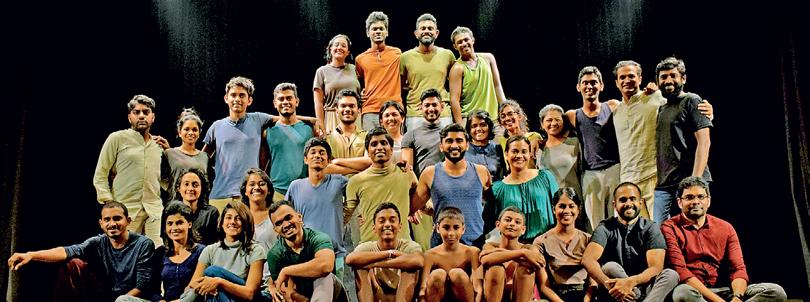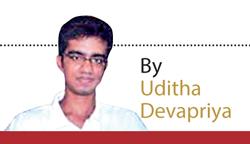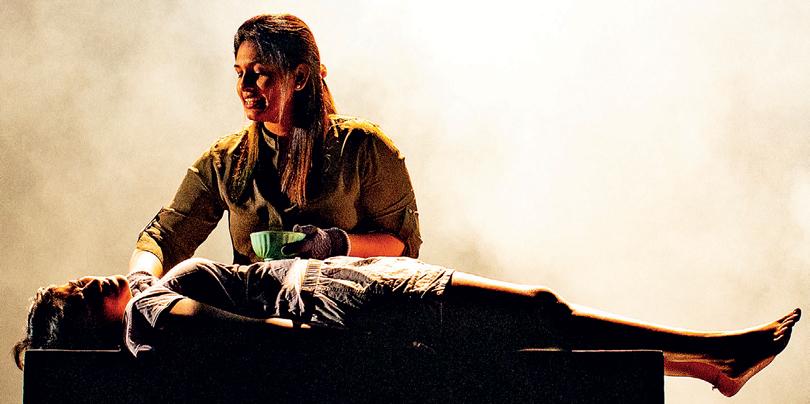Reply To:
Name - Reply Comment
 .
.
 Grease Yaka Returns will be staged at the Lionel Wendt this Sunday, July 7. It marks the second time the production will be staged at the Wendt and the third time, after its unveiling at the State Drama Festival, it will be staged to the public. Between the second and third shows, of course, much water has flown under it; recognised as the Best Production at the Festival, it returns this time not with a different plot and different actors and characters, but with a fresh, urgent relevance.
Grease Yaka Returns will be staged at the Lionel Wendt this Sunday, July 7. It marks the second time the production will be staged at the Wendt and the third time, after its unveiling at the State Drama Festival, it will be staged to the public. Between the second and third shows, of course, much water has flown under it; recognised as the Best Production at the Festival, it returns this time not with a different plot and different actors and characters, but with a fresh, urgent relevance.
I believe Grease Yaka Returns(GYR) represents a welcome change for the Sri Lankan stage. Unfortunately (and this is just putting it mildly), the change it attempted to put across was more or less checked, ironically, by its massive across-the-board victories at the Festival. On the first night months ago, the barely concealed guffaws and grins and the shocked demeanour of the audiences who flocked to the Wendt indicated that this wasn’t the type of offering the Wendt’s patrons had been used to.
If the patrons of the Wendt, or the Wendites – largely middle class, conservative, and bound by a rigidly classist worldview – were put off by the message in GYR, then the patrons of the Tower Hall were turned on by it. The kind of people who went and watched it at the Tower in March, after it was selected for the Drama Festival, were those who pandered to a different sensibility. The plays that had won it big at the Festival had an ingrained bias towards that sensibility. Before coming to what it was and is, let me admit that the fact that the writers, cast, and crew of GYR were able to defy the stereotype and triumph at the competition came as something of a shock to those who expected, naturally and understandably, a different outcome.
Those who were turned on, again naturally and understandably, were now turned off. The truth is no one from the Tower Hall milieu would have come in droves to watch GYR had it not been selected. Some of the comments, coming after its upset victory, indicated that the shock registered at it garnering all the major awards came down to issues of classism, language dynamics, and age. In that regard GYR had all the odds stacked against it: it was not made by a set of sweat drenched, dedicated, underpaid theatre activists; it had, as one paper called it, a “bombastic” mixture of English and Sinhala; and its cast and crew members were below or just above 30.
Compounding and worsening this dilemma was the allegation, made by several of the other nominated veteran directors and writers, that GYR had won purely if not mainly because of its novelty. Remarks made by the organisers of this year’s ceremony to the effect that they were looking for something radical and new among the submissions added to the frenzy and anger. The suspicion that they had been deliberately deprived of a deserving victory, lingered on, and the Sinhala press, for more reasons than one inclined towards the stereotyped image of the Sinhala theatre, took its side; a writer from one paper went as far as to imply that it was an oddity among plays “wholly” Sinhala or Tamil: in other words, an ugly duckling among the swans.
But then of course, the latter tale wasn’t just about an ugly duckling that turned into a swan: it was also about a swan that had to be an ugly duckling before it transformed. And right now, we have a considerable amount of swans that turned out too many ugly ducklings before they got the chance of completing their transformation. Let us admit one thing here then: the Sinhala theatre in its present manifestation, or avatar if you will, is not unlike the English theatre of the thirties and the forties; it remains captured by a sensibility that has outlasted its relevance.
If Shakespeare’s histories and English drawing room comedies were the mainstay of the early English theatre, that was simply because the English speaking upper classes occupied a make-believe world which in some anachronistic way approximated to Shakespeare’s Rome and the Englishman’s drawing room. The days of the University Dramatic Society, or DramSoc as it was known at the time, were soon to pass, and by 1956 its relevance had diminished, never to be revived again.
As Neluka Silva once observed, the response of the upper class to the rise of the Sinhala and Tamil speaking class was seen acutely in a play like Well Mudliyar, with its disparagement of the underclass who could not wield English or who tried to ape bourgeois manners. Depending on how you view what happened, 1956 dislodged or amplified that upper class. The fate of English Only theatre (DramSoc) wasn’t as ambivalent, though: within a decade, it was rendered irrelevant.
We know, from archival material, that 1956 didn’t “happen” because of the Left or the proletariat or even the peasantry only, but because of sections of the petit bourgeoisie who formed, over the following years, a class unto themselves. They were some of the biggest beneficiaries of the reforms 1956 brought with it. They left behind a cultural imprint as well as an economic and political one: the second generation playwrights, who came after Sarachchandra, Dayananda Gunawardena, Gunasena Galappaththy, Dhamma Jagoda, and the rest, were from a less bilingual environment and formed an intelligentsia of their own. It is not a coincidence that all three recipients of this year’s Lifetime Achievement Award at the Festival hailed from this milieu: K. B. Herath, Dharmasiri Bandaranayake, and the great Jayalath Manorathna.
The second generation was followed by a third. This, the generation to which the likes of Rajitha Dissanayake, Chamika Hathlahawatte, and Buddhika Damayantha (all three contenders at this year’s Festival) belong, took on new themes which still reflected the undercurrents of 1956. By now, many of the beneficiaries of 1956 had turned into a new middle class, forming the crest of the cultural circles in the country.
The second generation playwrights had thematised the insurrections and the early stages of the war. By the time Rajitha, Chamika, and Buddhika entered the theatre, the war was on an exit path. It was hence the absence of the war in the consciousness of the middle class, and not its profusion, which captured their attention; that is what led my friend Dhanuka Bandara, in a review of Rajitha’s Siriwardhana Pawula, to claim that “Sri Lankan writers often feel compelled to bring into their craft the ‘ethnic issue’ simply to make their work ‘politically relevant’.”
The characters in these plays reflect a dilemma peculiar to the new middle class: their desire to keep up with the cosmetics of their milieu and their need to keep up with the cost of those cosmetics. Unfortunately, even in 2019 we continue to be bombarded by this motif; I say “unfortunately” because, pretty much like the drawing room comedies of pre-1956, it remains divorced from recent developments in the theatre.

 1956 bridged the gap from the drawing room comedies to the political theatre of the eighties and the middle class theatre of the new millennium. What we are seeing now is a repeat of history, a return to a hybridised form of English theatre that is not really English, but is in fact bilingual. Maname needed a 1956, and it was preceded by other experimental plays by Sarachchandra; like Maname, Grease Yaka Returns too has its own “1956”, and was also preceded by several experimental productions.
1956 bridged the gap from the drawing room comedies to the political theatre of the eighties and the middle class theatre of the new millennium. What we are seeing now is a repeat of history, a return to a hybridised form of English theatre that is not really English, but is in fact bilingual. Maname needed a 1956, and it was preceded by other experimental plays by Sarachchandra; like Maname, Grease Yaka Returns too has its own “1956”, and was also preceded by several experimental productions.
It goes without saying that reflected in the bilingualism of the hands and brains behind GYR is the cultural factor which provoked the rise of the new theatre generation. 2019 was in that sense a significant year: 18 years ago, thanks to Rajiva Wijesinha and Tara de Mel and others, 93 schools opted to reintroduce the English medium; around a year later, the number had swelled to around 400. 18 years, of course, is the average tenure of a student. In other words, GYR triumphed in the year the first generation of English medium students are studying for, or will be doing, their A/Levels. The ugly duckling has turned into a swan; it remains to be seen whether it will be accepted as a swan by those who have refused to acknowledge its very existence so far.
The author can be reached on [email protected]